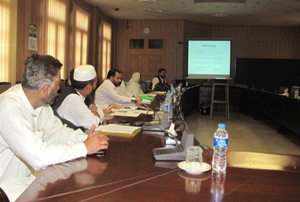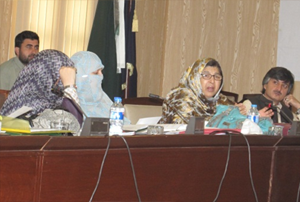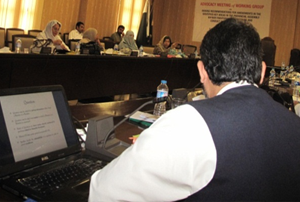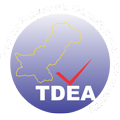Pak Women, a local not-for-profit organization in the Khyber Pakhtunkhwa province of Pakistan, has worked with provincial legislators to form a working group that proposes recommendations to amend the Conduct of Business Rules of Khyber Pakhtunkhwa (KP) assembly. The first-of-its-kind working group includes members of the provincial assembly, assembly bureaucrats such as the secretary and the deputy secretary, and civil society representatives from Pak Women. Pak Women is supported by USAID under the umbrella of Citizens’ Voice Project – a $45 million democracy and governance initiative.
For the KP assembly, a general election often means many new faces, leaving the task of legislation in the hands of legislators who are unaware of the process of legislation and the conduct they must follow.

“We are not doing this for ourselves, but for the upcoming members of the House,” says Amina Sardar, Pakistan Muslim League-Nawaz’s member of the KP Assembly (MPA) from Mansehra. She is among the most active members of the working group, often presenting research-based arguments. “This [Pak Women initiative] is the best thing that has happened to the KP assembly in two decades,” says Amanullah Khan, Secretary, KP Assembly. “USAID’s role and engagement with the civil society is of utmost importance in these times as one of the major needs for the KP’s MPAs is regular capacity-building, which is efficiently possible only through such initiatives,” according to the secretary.
Pak Women implemented the project, entitled Citizens’ Voice for Effective Legislative Governance in KP. Under the project, the organization had been interacting with the KP Assembly for some time. These interactions were meant for advocacy and awareness-spreading purposes, as Pak Women was educating both citizens and their elected representatives on transparency and accountability in the context of special funds for the MPAs and other developmental funds. Through these interactions, Pak Women was also able to convince the KP MPAs and part of the bureaucracy at the KP Assembly that the members of the House were in dire need of capacity-building in light of their lack of technical knowledge of the proceedings as well as effective representation of the people.

Formed after formal training of the MPAs, this working group meets at least twice a month. With its members being MPAs, Assembly bureaucrats and civil society representatives, the group is a healthy mix of stakeholders. With at least ten members, out of which six are women, five MPAs, and one civil society participant, the group is spearheaded by talented women. Now entering its second month, the group is tasked with proposing amendments in the rules of business of the assembly and its standing committees.
In its first three meetings, the group has proposed amendments in the rules of procedures. For instance, recommendations include that a member should be allowed to ask three starred and three un-starred questions in one sitting; there should be a penalty for the departments and ministries that do not respond to the questions by the MPAs in a timely manner or show inability to provide the required information; the total number of supplementary questions a member can ask in a day should be four; and only 20 questions should be asked on the floor per sitting.
Other matters discussed include the legislative process such as the calling attention notices (CANs), resolutions, bills and functions of the committees. A member pointed out that there is no provision for judging the admissibility of CANs and fewer CANs come on the floor of the House while many of them remain unaddressed. Another member pointed out that the Private Members’ Bills, which has financial implications should be responded by the concerned government department within one month. Similarly, it was suggested that unanimously adopted resolutions should be binding on the provincial cabinet and they should be implemented. It was also stressed that the role of standing committees be streamlined. These suggestions were presented in the form of the best practices from around the world. Much of the discussion centered on, in-depth, sharing of knowledge by experts within the group.

“This is effective progress,” says Quomi Watan Party’s Anisa Zeb Tahirkheli, former Senator and current MPA, KP. She added, “MPAs equipped with comprehensive knowledge of their functional capabilities and responsibilities will serve the people in the manner the people’s representatives ought to serve.” Sardar Hussain Babak, MPA, KP, of the Awami National Party (ANP) and a senior political figure in the province, agrees with her remarks. “The need of capacity building is undeniable as the process of legislation and all else [the rules of business] are the most important factors in our role as people’s elected representatives,” he adds.
An effective role by this working group will lead to amendments in the conduct of business in a manner that allows a productive legislative agenda and transparent government oversight. Such an endeavor is meant to ensure effective representation of people in the KP Assembly.




















